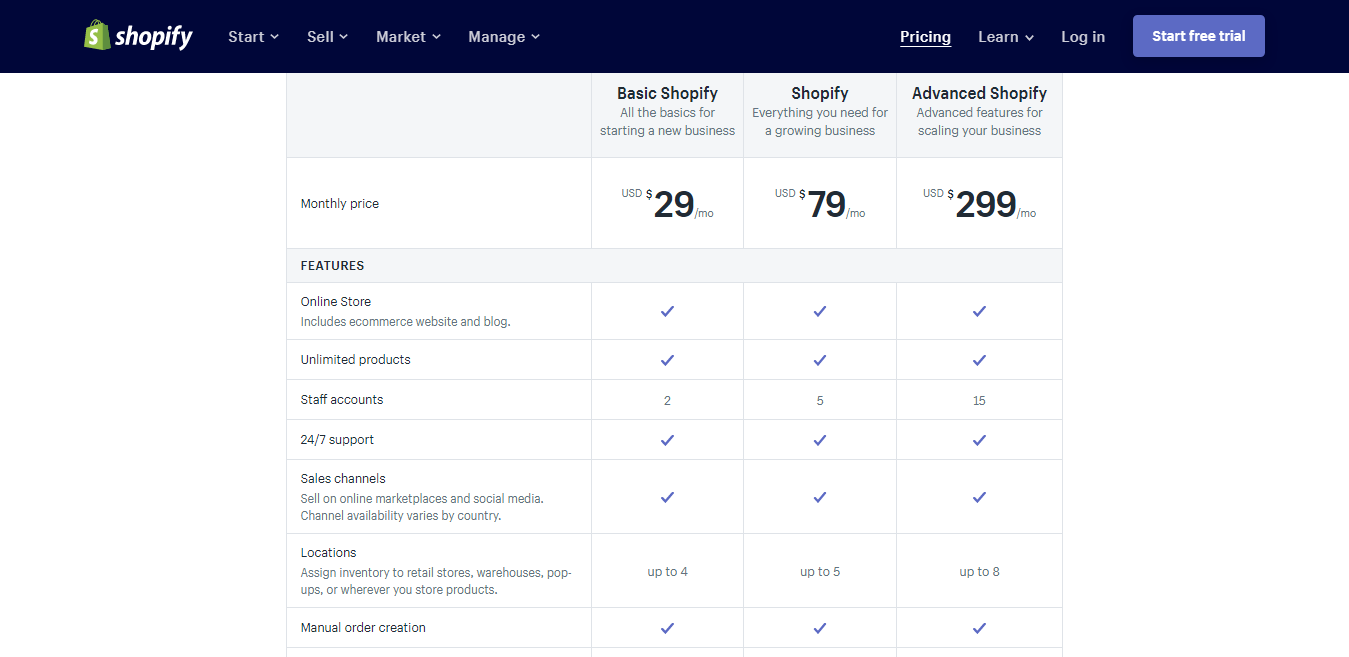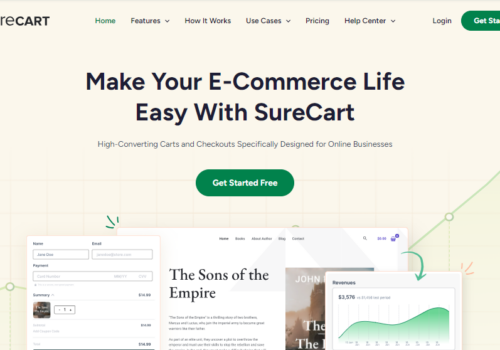
ShopifyLearn More |

EtsyLearn More |
|---|---|
| $ Pricing | $29/mo | $0.20 |
| Best for |
Shopify is a great online platform that helps you build your own eCommerce website. It is one of the best e-commerce building platforms in India. Foun |
Etsy is an online marketplace that allows seller to sell their products online. Founded in the year 2005 by Haim Schoppik and Chris Maguire, Etsy is b |
| Features |
|
|
| Pros | |
|
|
| Cons | |
|
|
| Ease of Use | |
|
Shopify has a very user-friendly interface and navigating through it is also very easy |
Etsy is also very easy to use and follows a very straightforward approach to set things up. |
| Value For Money | |
|
It is a bit costlier than other platforms. |
Etsy does not charge any monthly fees but it charges some listing fees along with transaction fees. This does not create a problem for small-scale businesses but it is not preferred by big businesses. |
| Customer Support | |
|
Shopify provides support online as well as on the phone |
Etsy offers great help and support for all its users. You can easily find all the answers to your problems by searching for them in the help center search menu. |
Being an online seller is the most trending and easy way of generating some extra income. You can either sell your products through your e-commerce website or make use of online marketplaces for the same.
Should I sell through my website or should I make use of a marketplace?
Many people choose to sell through their e-commerce store as these stores give them full authority over how the website looks and how the product variants appear.
Marketplaces are also used by many people as they can easily sell their products by setting up an online store without having to build and maintain a complete website.
Shopify is a great platform for building your e-commerce website and Etsy is a famous marketplace for selling your products online.
Through this blog let us compare Shopify and Etsy and check which is the better option. This comparison will also help us determine if one of them can replace the other.
Let’s get started.
Shopify vs Etsy Comparison 2025 | The Ultimate Comparison (Must Read)
What is Shopify?
Shopify is a great online platform that helps you build your own eCommerce website. It is one of the best e-commerce building platforms in India.
Founded by Tobias Lütke and Scott Lake in 2004, Shopify is now one of the biggest e-commerce platforms all over the world.
Shopify has a great collection of tools that help you launch and run your business online. It helps you in finding your customers, keeping a track of your sales, and managing your daily business.
Shopify is a great place to start your business as it helps you to run and grow your business. It has a great App store and helps you build your business through many marketplaces.
Shopify also offers you the help of an expert if you need some expert advice on launching and running your business.
What can you sell on Shopify?
You can easily sell all types of products on Shopify. Shopify allows you to sell physical as well as digital products.
This is a great feature as digital products are also very trending and a single platform for selling both these products is preferable by everyone.
What is Etsy?
Etsy is an online marketplace that allows seller to sell their products online. Founded in the year 2005 by Haim Schoppik and Chris Maguire,
Etsy is being used by over 1.75 million sellers all over the world. It is also used by over 33 million buyers across the globe.
Etsy helps you to sell your products directly to your customer through its explicit marketplace which does not compel the customer to first go to your store to complete the transaction.
Etsy helps you to reach your potential customers and promote your product. It also is a very useful tool when we talk about the ease of selling and the user-friendliness of an online selling tool.
What can you sell on Etsy?
Through Etsy, many people from different parts of the world purchase a variety of products. As Etsy is a marketplace the types of products that can be sold on Etsy are very limited.
You can easily sell handmade products along with some crafted products to your customer. You can even sell Vintage products which are a minimum of 20 years or older through Etsy.
Shopify vs Etsy: Features
Comparing the features of Shopify and Etsy will help us get a better insight into the types of features provided by each of them. Let us have a look at the different features provided by Shopify and Etsy.
Shopify Features:
Etsy Features:
1. Ease of Use: Etsy is also very easy to use and follows a very straightforward approach to set things up. You do not need to be a coder or programmer to start using Etsy. All you need is to create your store, add products, and start selling.
2. Themes and Design: Etsy has its design and theme layout. Once you start using Etsy, the store will automatically adjust to the design and layout offered by Etsy. You do not have to be worried as all the designs offered by Etsy are very simple and classic, which helps the user to easily navigate through your website.
3. Customization: Etsy doesn’t have a very flexible customization approach. It has very limited options for customizing your store.
Using the customizations offered by Etsy is very easy for small businesses, but if you have a big business and want to make your website very attractive using various customization methods then Etsy does not provide enough scope for doing that.
4. Domain name: Etsy can not be used on your own domain as it is a marketplace. You can add your store to it easily. If you wish to use Etsy on your domain then you need to integrate with the Etsy Pattern Builder tool which helps to achieve this purpose.
5. Fees: Etsy does not charge any monthly fees but it charges some listing fees along with transaction fees. This does not create a problem for small-scale businesses but it is not preferred by big businesses.
6. Payment options: Etsy accepts payment through all the major Payment options used widely all around the world.
Payment processing through Etsy also costs you some money but this is generally provided by the payment processing companies like the credit card companies. It makes use of PayPal for processing payments.
7. Attracting Customers: Etsy is very helpful in attracting potential customers to your product.
People can find your product directly through Etsy without first trying to locate your store and then find your product. This simple technique does help the customers to find your product easily.
8. Help and Support: Etsy offers great help and support for all its users. You can easily find all the answers to your problems by searching for them in the help center search menu.
9. Forum: Etsy also has its community form and groups where you can easily discuss and troubleshoot all your problems. In case you are not able to find the relevant answers, you can get in touch with their support team which is always ready to help you.
Shopify vs Etsy: Pricing
Pricing plays an important role when choosing any platform for our use. Knowing the pricing plans for the platforms and comparing the features provided in each platform is a must to be ensured that the money we invest is worth spending.
Let us look at the pricing plans of Shopify and Etsy and find out how much each of them cost.
Shopify Pricing:
There is a free trial period of 14 days which is enough for you to set up the store. After the trial period is over, to continue using Shopify it offers three pricing plans for all its users. Let us look at the features offered in each plan.
Etsy Pricing:
Shopify vs Etsy: Pros and Cons
Let us compare Etsy and Shopify based on their pros and cons. Comparing the Pros and Cons of Shopify and Etsy will help us get more insight into the strong and the weak points of each of them.
We can easily determine where one of them leads and the other lags.
Shopify Pros & Cons:
Pros:
- It provides a wide range of themes and flexibility.
- It provides more apps and integrations.
- It is good for all big businesses as well as small businesses.
- It can be said to be the best platform for e-commerce.
- You can easily sell unlimited products with unlimited variations.
- It also offers the feature of multi-channel selling through various social media sites.
Cons:
- You have to use third-party applications for selling digital products.
- It is a bit costlier than other platforms.
- It charges transaction fees if you do not use Shopify payments.
Etsy Pros & Cons:
Pros:
- It is a very user-friendly platform and easy to use for new users.
- It helps you to attract more customers to your products and hence brings more traffic to your business.
- The cost of using Etsy is also very low as compared to other similar tools
Cons:
- There are some restrictions on the type of products that can be added to Etsy.
- You have to pay a very high transaction fee which goes up to 5%of the cost of the product.
- Etsy does not give you more scope to be creative.
Shopify vs Etsy : Features comparison
The Biggest Difference Between Shopify and Etsy
The biggest difference is that Shopify offers you a platform to create an independent online store with greater control and customization, requiring more effort in marketing and customer acquisition.
Etsy, on the other hand, is a marketplace that provides ease of entry and a built-in audience, but with more limitations on what can be sold and how your shop is presented.
Your choice between Shopify and Etsy should be based on your business goals, the nature of your products, and your willingness to invest in marketing and brand development.
Shopify vs Etsy: Who Should Use Them?
So based on the various features offered by Shopify and Etsy, here are some recommendations for the users. Have a look at them and determine whether you are the correct user and which tool is the best for you.
Who should use Shopify?
Who should use Etsy?
FAQs on Shopify vs Etsy Comparison
👉 How can I create my shop on Etsy?
Creating a shop is very easy, you just have to create your Etsy account, set your shop, set your currency, add products and you are ready to sell your products.
👉 How do I get paid on Etsy?
Payments on Etsy are usually carried out through PayPal accounts. It is usually advised to use your PayPal business account for the same.
👉 Can I use my domain name with Shopify?
Yes, you can use your domain name with Shopify and you can also buy a new domain name from Shopify.
👉 Can I use Shopify for free?
Yes, you can use Shopify for free. Shopify offers a 14 days free trial which can easily be started without any payment
👉 Do I need a credit or debit card to create my store on Etsy?
No, you do not need a credit or debit card. To become a verified seller on Etsy you need to have either a credit card or a registered papal account to start selling.
Quick Links:
Conclusion: Shopify vs Etsy Comparison 2025
We have looked at the features, pricing, and pros and cons of Shopify and Etsy. I hope this blog has helped you get a clear understanding of both these platforms and now you are capable of making your decision.
Selling on a marketplace and selling on a website, both have their plus points. When you sell on your website, you can choose how to customize it for better performance.
Selling your product on a well-established marketplace works better for those who do not wish to invest their time in handling a complete website.
So, we can say that though Shopify on Etsy is unique in its ways, one amongst them cannot replace the other. You can easily decide which tool to use for selling online based on your requirements.
Happy Selling!!











